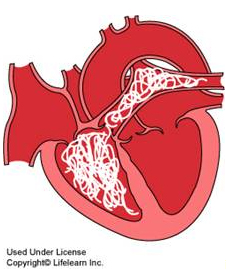
Heartworm disease, or dirofilariasis is a serious and potentially fatal disease. It is caused by a blood-borne parasite known as Dirofilaria immitis and is transmitted by their intermediate host, the mosquito. If left untreated, heartworms can grow up to two-feet long and can continue to multiply in your pet’s circulatory system before any symptoms are detected. Some dogs may not show any symptoms at all until the disease is severe enough.
In dogs, signs of heartworm disease can range from coughing, fatigue, and weight loss to difficulty breathing and a swollen abdomen (caused by fluid accumulation from heart failure).
Although it is a very rare occurrence, cats can indeed get heartworms. Cats can suffer from a syndrome referred to as heartworm-associated respiratory disease (HARD); the symptoms can be subtle and may mimic those of asthma or allergic bronchitis. Signs of respiratory distress, such as rapid or difficult breathing, wheezing, and panting, are common. Other symptoms include coughing, vomiting (typically unrelated to eating), and loss of appetite or weight. Heartworm infection is more difficult to diagnose in cats than it is in dogs.
Although the incidence of heartworm disease has decreased over the years, it is still highly recommended by Veterinarians to protect against this parasite as treatment can be complicated, risky, and very expensive. If not treated early enough, it can cause life-long complications to your pet’s heart, lungs, liver, kidneys and even death.
Luckily, most products recommended for flea and tick prevention also protect against heartworm disease and do not require any additional medications. If you would like more information on heartworm disease or our products available for dogs and cats, please contact us.
